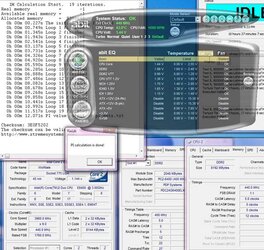Mobo: IP35 Pro v1.1
CPU: E8400
RAM: 4 sticks of 2GB GSkill DDR2-1000.
I've almost got it stable at 3.6GHz (which should be cake), yet I still have random BSODs and other strange behavior under certain conditions.
I'm convinced it's a voltage issue of some sort since the system becomes much more stable as I raise MCH and DDR2 voltage. Yesterday I was able to run The Witcher all day without any issues, so I believe I found a stable or nearly-stable setup.
BIOS: 16 Beta 04.
VCore is 1.3625 (reads 1.22V after droop)
DDR2 is at 2.2V (the sticks are rated for 2.1V), and the timings are all Auto. I would have left this at 2.1V except that I get an error immediately upon booting windows. The sticks get pretty warm to the touch.
CPU VTT I left at stock settings because I have no idea what it's for.
MCH is currently 1.42v (I kept bumping it up until it was stable... how much is too much?).
I left both ICH voltages at stock, which might be the cause of my remaining issue:
I have four hard drives in the system, and two are RAID0'ed. Just today I got another BSOD in the middle of a 100+GB transfer from a storage drive to my RAID array.
Anyone have any advice on whether (or how far) I should increase/decrease voltages?
CPU: E8400
RAM: 4 sticks of 2GB GSkill DDR2-1000.
I've almost got it stable at 3.6GHz (which should be cake), yet I still have random BSODs and other strange behavior under certain conditions.
I'm convinced it's a voltage issue of some sort since the system becomes much more stable as I raise MCH and DDR2 voltage. Yesterday I was able to run The Witcher all day without any issues, so I believe I found a stable or nearly-stable setup.
BIOS: 16 Beta 04.
VCore is 1.3625 (reads 1.22V after droop)
DDR2 is at 2.2V (the sticks are rated for 2.1V), and the timings are all Auto. I would have left this at 2.1V except that I get an error immediately upon booting windows. The sticks get pretty warm to the touch.
CPU VTT I left at stock settings because I have no idea what it's for.
MCH is currently 1.42v (I kept bumping it up until it was stable... how much is too much?).
I left both ICH voltages at stock, which might be the cause of my remaining issue:
I have four hard drives in the system, and two are RAID0'ed. Just today I got another BSOD in the middle of a 100+GB transfer from a storage drive to my RAID array.
Anyone have any advice on whether (or how far) I should increase/decrease voltages?

